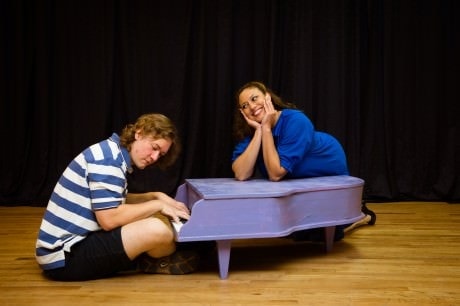In the first in a series of interviews with the cast and director of Reston Community Players’ You’re A Good Man, Charlie Brown, meet Alana Sharp, who plays the psychoanalyzing Lucy Van Pelt, and Eric Hughes, who plays Lucy’s Beethoven obsessed crush, Schroeder.

Fall is in the air, and it’s perfect weather for tangling kites in trees, trying to finally win a baseball game, and hoping against hope to finally kick the football without having it pulled away at the last minute by a certain psychoanalyzing little girl as Reston Community Players (RCP) opens its 48th season on October 17, 2014 with the award-winning musical You’re a Good Man, Charlie Brown.
“What could be more fun than a talking dog with a flying WWI dog house? Or the chance to work with such a talented group as the Reston Players brings together both on and off stage?,” says RCP Director Richard Bird.
You’re a Good Man, Charlie Brown follows a typical day in the life of Charlie Brown and the Peanuts gang. Featuring such memorable songs as “My New Philosophy,” “Suppertime,” and “Happiness,” the Broadway revival garnered Tony Awards for Best Featured Actress in a Musical (Kristin Chenoweth) and Best Featured Actor in a Musical (Roger Bart).
Reston Community Players’ You’re a Good Man, Charlie Brown is directed by Richard Bird with music direction by Mark V. Deal. The ensemble cast features Richard Farella (Charlie Brown), Alana Sharp (Lucy), Nina Jankowicz (Sally), Sidney Davis (Linus), Eric Hughes (Schroeder), and Terry Barr (Snoopy). Laura Baughman is the producer.
Diane: Please introduce yourself and tell our readers where they may have seen you perform on DC Metro area stages.

Alana: My name is Alana D. Sharp. I work part time but my main focus is parenting and wife-ing my family. I’ve been working with RCP for the past 7 or 8 years and most recently performed as Madame Thenardier in last winter’s production of Les Misérables. This is my seventh show with RCP, and I have participated in ensemble roles (Curtains, Seussical, and Joseph and the Amazing Technicolor Dreamcoat), as well as in featured roles (Nina Weiss in Brooklyn Boy and Estelle in The Full Monty). I also played M’Lynn Eatonton in Curtains Up’s Steel Magnolias and Aunt Dete in Elden Street Players’ Heidi. I earned a Bachelor of Fine Arts from Wright State University in Acting many moons ago.
Eric: I’m a singer who writes computer programs to make money. I also act some, mostly because that’s the best way I’ve found to get on stage singing fun music. This is my third show with RCP (previous: Dr. Fine/Dr. Madden in Next to Normal, ensemble in Les Mis), and before that I was Chip Tolentino in LTA’s Spelling Bee.
What are your earliest memories of Charlie Brown and the Peanuts gang? And why where/are they so important to you?
Alana: As a child, nothing proclaimed a holiday season like the announcement of the date and time of the Peanuts holiday special (usually Monday nights at 8 pm, I believe). And as pitiful as Charlie Brown was, there was a resilience about him that brought you back every single time.
Eric: My father was an Air Force pilot and had a number of Aviator Snoopy items that I saw regularly: a tie tack, ornaments, etc. I don’t know whether he actually liked Peanuts much or they were just things others gave him, but I was around quite a bit of Snoopy from early on. I would also doodle Snoopy and Woodstock on school worksheets, handouts, etc. all through elementary school. Some of my earliest memories of my grandparents involved sitting and reading through old (70s-era?) Peanuts comics. I always wondered if it was a different artist because the art style was so different early on!
What did you perform at your audition, and how did you react when you learned you had the role?
Alana: I did a song from The Tap Dance Kid called “I Could Get Used to Him.” I changed the context of the song and imagined a CHILD singing about the boy she has a crush on. “When he talks like that, he’s like a TEN year old….” “Oh, I could get used to him. No birthday cards, I guess. No just-for-nothing-flowers.” “Oh I could get used to him. And I’d like to think that he’ll get used to me.”
I felt pretty good about my audition, I guess, but you just never know. So I was excited to get called back. Unfortunately, I was up against a good friend. The callbacks were a great example of talent in this area. Rich and Mark had 5 VERY different Lucys to choose from. I would think that’s a good thing. I left feeling good about my performance, but being total unsure about what direction they would go. I honestly thought my friend nailed it, so I was pretty surprised when I got the call.

Eric: I made a really awful choice for my audition piece, but in retrospective, it was pretty fun. I sang ‘Anthem’ from Chess, and just prior to starting, Rich and Mark reminded me that the show stars kids, so I needed to try to deliver it as much like a 7-to-10-year-old as possible. So I did it somewhat like how I’d imagine Linus doing it for a school assembly.
What do you like most about your character?
Alana: Lucy is assertive. She doesn’t see herself as bossy or crabby. If everyone would just listen to her, she wouldn’t be crabby or bossy. Really, she’s just trying to help everyone through life but they aren’t making it easy for her. Sometimes her frustration is more apparent. But really, it’s not her fault.
Eric: Schroeder is very practical and musical. He’s a lot more driven and talented than I am (I mean, he can play complex pieces on a toy piano with painted-on black keys! Tell me that doesn’t take talent!), but he’s also somewhat reserved and extremely passionate, which I relate to.
What do you like least about your character?
Alana: I wish they would all be nicer to Charlie Brown.
Eric: It’s been hard for me trying to develop his character outside of his relationship to his piano ;-)
What are some of the challenges and rewardsof bringing an iconic character to life?
ALANA: In this case, these are two-dimensional characters, and as an actor it’s up to me to flesh it out and make Lucy a real person. And in doing so, I have to maintain the “essence” that makes Lucy a crabby person we still like. I really want to channel the cartoon character that we all remember so that she’s familiar to the audience, but the challenge is doing that while making her “real.”
ERIC: One major challenge is that everyone has strong ideas about how these characters should look and sound–many of them formed by the animated TV specials. If we don’t sound or look “right” the audience might not buy in, but we can’t just copy those portrayals, or it’ll come across as fake or derivative. So we need to get the right mix of personality and behaviors that make the audience go “oh, yeah, that’s her/him!” while bringing a fresh take on the characters.
How have you gone about creating your character?
ALANA: Right now, I’m trying to find the Peanuts “cadence.” There is a familiar rhythm to the way the lines are spoken that I’d like to incorporate. We’re just starting to develop physicality as we get our characters up on their feet. I’ve been watching children move so I can reestablish my center of gravity to that of a 6 year old instead of a (blankety-blank) year old woman. Internally, I need to find the reasons WHY Lucy acts the way she does. Like I said, she doesn’t see herself as crabby or bossy. Everyone has reasons for what they do, so I need to justify her actions.
ERIC: I’ve been reading old Peanuts strips and watching some of the old cartoons, including ones I’d missed growing up. I’m also trying to connect more with my inner child. Part of what’s wonderful about the Peanuts gang is that they have the relaxed (or absent) inhibitions of children, take delight in simple things, and yet are able to deal with complex subjects. Adults are (often) so closed off, guarded, and occupied with a multitude of tasks; it’s freeing and refreshing to take on a more child-like mindset.
What are your solos or big number, and what does the audience learn about your character when you sing these songs?
Alana: “Schroeder” is a “love song” (HA!) as Lucy expresses her feelings to Schroeder in typical Lucy fashion. “Little Known Facts” is an opportunity for Lucy to explain the world to her little brother and no one is going to get in her way. She wants Linus to look up to her and she’ll do whatever she must to make that happen. But I’m really enjoying “Book Report” and the “Glee Club.” These are full cast numbers that are clever, funny, and typical Peanuts. You see these kids as kids and not the pseudo adults they are in the comics.
ERIC: My biggest moment is in “Beethoven Day”, singing about my idol and favorite composer. It’s a jazzy piece that’s a lot of fun to sing. In “Book Report” we get to see a different aspect of Schroeder when he goes off on a wild tangent and then tries to tie it back to the assigned topic.
What character that you are not playing is your favorite and what song that you are not singing is your favorite, and why?
Alana: I love Sally and Nina’s youthful exuberance in playing her. She’s adorable! “Happiness” is a sweet ending that gives Charlie Brown just enough hope to try again tomorrow.
Eric: I really like Linus–he’s very much an armchair philosopher, full of knowledge about all kinds of things, and yet strikingly naive sometimes. Despite his security crutch (i.e. blanket), he’s actually very self-assured and able to deliver cogent and confident opinions. I love Sally’s song “My New Philosophy.” It really captures the childlike spirit of the show, while also poking fun at how frequently our consumerist culture picks up and drops fads, diets, and 5-step approaches to anything. “Philosophies” like Sally’s are treated as disposable by a large population.
Sally has lots of philosophies in the show. If you had one philosophy to share, what would it be?:
Alana: Never say never! Theatre and art are constantly pushing the limits. I have always been willing to take chances in the theatre and have been recently trying to instill that philosophy in other areas of my life. I competed in my first (sprint) triathlon in June…a feat I would have said I NEVER would have attempted five years ago. Athletics and physical exercise have not been a priority in my life. But the challenge was set, and I was successful. Achieving that kind of success bolsters you and makes you feel like you can do anything. So I’m doing more…things I thought I could NEVER do! Odds are I won’t participate in an Iron Man race or climb Mt. Everest….but I won’t say I NEVER will. It’s amazing what you CAN do when you open your mind and take a chance.
ERIC: One of my favorites is from the Japanese poet Basho (rephrased somewhat): “Don’t just study the footprints of those who came before you; look up at where they were going!
What do you hope audience will take away from seeing You’re a Good Man, Charlie Brown?
ALANA: I hope they leave feeling happy. I hope children leave wanting to see more live theatre.
ERIC: I’d like them to be transported to a simpler, kinder existence for a little while, where they’re free to experience a no-strings-attached happiness.
Why should people come see You’re a Good Man, Charlie Brown? What makes this show special?
ALANA: This show is great family entertainment. It will be familiar to generations that have known the Peanuts gang since the beginning, as well as fun for today’s children who are inundated with various cartoon characters. The Peanuts gang is classic and everyone should get to know these characters.
ERIC: The characters are ageless, and the appeal is universal: it’s not a family show, in that it doesn’t cater exclusively (or condescendingly) to children, but it’s accessible to children while allowing adults to reminisce about their childhood, breathing new life into their memories of the Peanuts gang and the joy of reading the Sunday morning comics section.
You’re a Good Man, Charlie Brown plays from October 17 – November 7, 2014 at CenterStage at the Reston Community Center – 2310 Colts Neck Road, in Reston, VA. All performances are at 8:00 p.m. with the exception of 2:00 p.m. matinees on October 26th and November 2, 2014. For tickets, call the CenterStage box office at (703) 476-4500 x 3, or purchase them online.
CenterStage is handicap accessible and offers listening devices for the hearing impaired.





